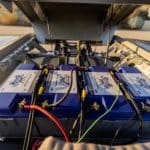
MENUMENU
TALK TO AN EXPERT
Special Hours: 7AM – 6PM PST
TALK TO AN EXPERT
Special Hours: 7AM – 6PM PST
Living off the grid and being self-sufficient provides an incredible amount of freedom. However, it’s not the easiest of lifestyles to manage. Many hear about the benefits and quickly decide to jump into the lifestyle. These well-intentioned individuals often quickly discover this way of life has a handful of challenges.
Let’s take a look at five of the biggest challenges of living off the grid!
There’s a bit of ambiguity around the idea of “living off the grid.” Some refer to themselves as living off the grid because they’re self-sufficient in powering their residence without the need of an electric utility company. Others believe there’s more to the lifestyle than just generating your own power; that it’s a way of life.
When you’re living off the grid, self-sufficiency is the goal. Being self-reliant requires having a plan for power, fresh water, and sewer systems. Some take it a step further and grow or raise their food as well. For many, living off the grid is a gradual process where they slowly become less dependent on others.
Homesteading is one example of living off the grid. This lifestyle revolves around not only being self-sufficient as far as utilities, but also for food and clothing. Many homesteaders cook from scratch, raise livestock for food, make clothing and household items, and more. It’s a natural way of living that can be sustainable and thrifty. The lifestyle appreciates quality and rejects a mindset of consumerism.
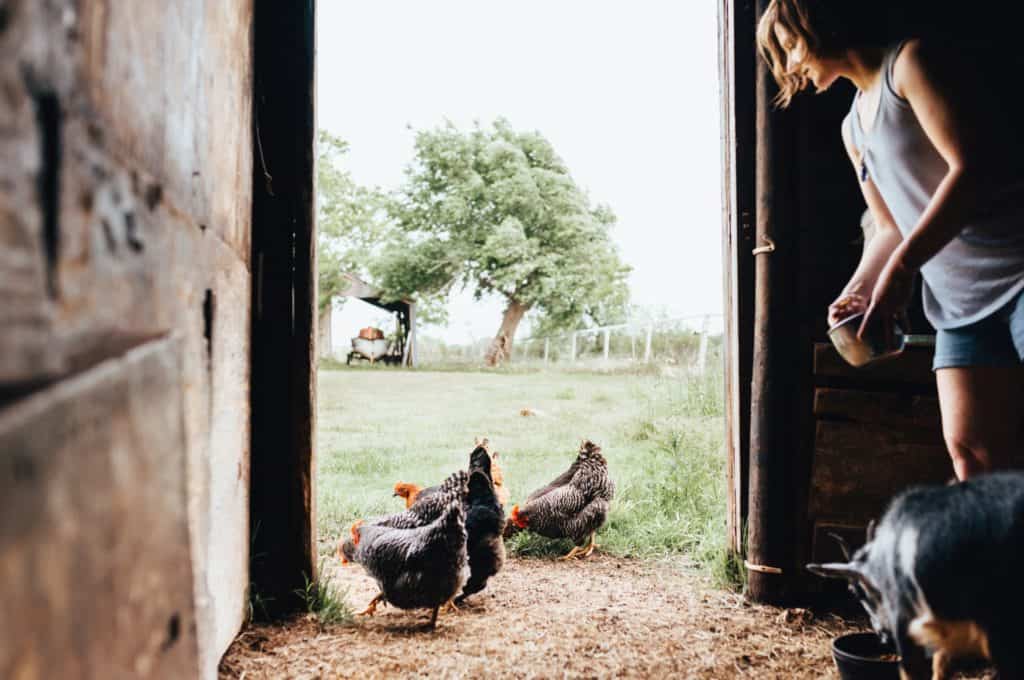
Simply living off the grid, however, focuses more on self-reliance. Some choose to live off the grid to prepare for a catastrophic event. Others disconnect from the grid to enjoy independence and a bit of peace. Being self-sufficient can provide peace of mind and even buy time to create a plan amid a chaotic event.
Living in a rural environment provides optimal opportunities for off-grid living; however, it’s still possible in urban and suburban areas. While cities or towns may require a connection to the city’s power grid, you can use solar panels or wind turbines to create your power.
Generating your own power is extremely convenient, especially during power outages or rolling blackouts. With enough solar panels or wind turbines, you may even be able to sell back the power you generate to your local power company for a profit.
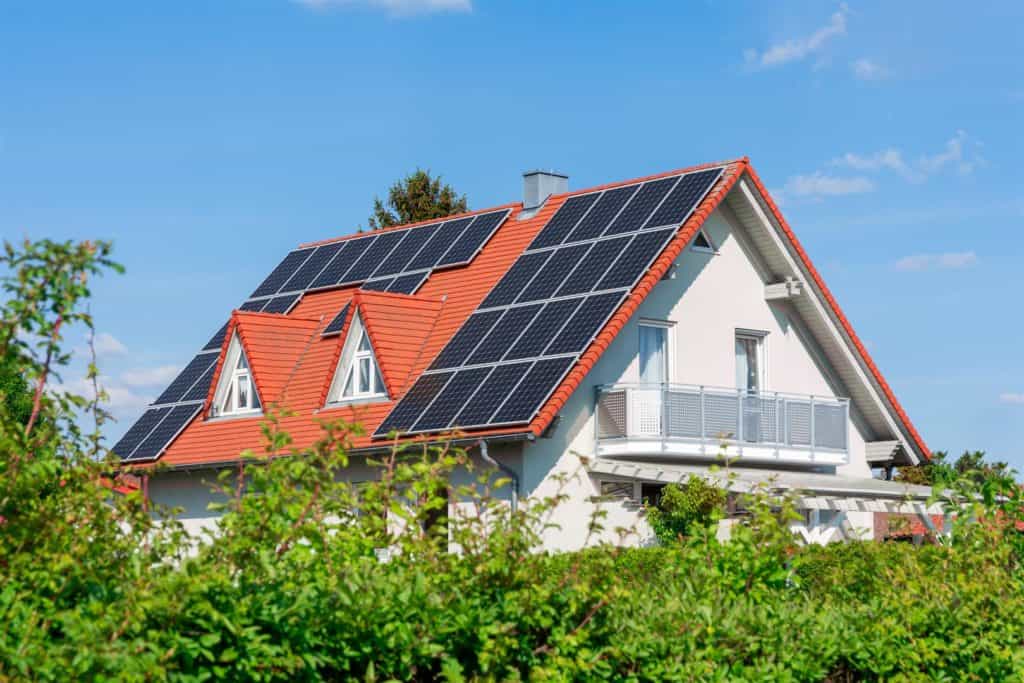
Whether it’s in an RV or a boat, mobile off-grid living is possible as well. Just because you’re living in an RV or boat doesn’t mean you have to forfeit the luxuries commonly found in residential living. Living off the grid in an RV or boat means finding lightweight and efficient ways to generate your own power and dispose of your waste.
Generating your own power while mobile likely means relying on wind, solar, or a gas generator. RVs and boats often have large storage tanks for water and a sewer system. If the boat or RV has a composting toilet, waste can serve as a fertilizer for plants and other vegetation.
One of the best advantages of choosing an RV or boat for living off the grid is that they’re mobile. If your situation or the weather changes, you can pack up and move to a more suitable location.
➡ Check out our recent article, RV Solar Panels: A Guide for Beginners
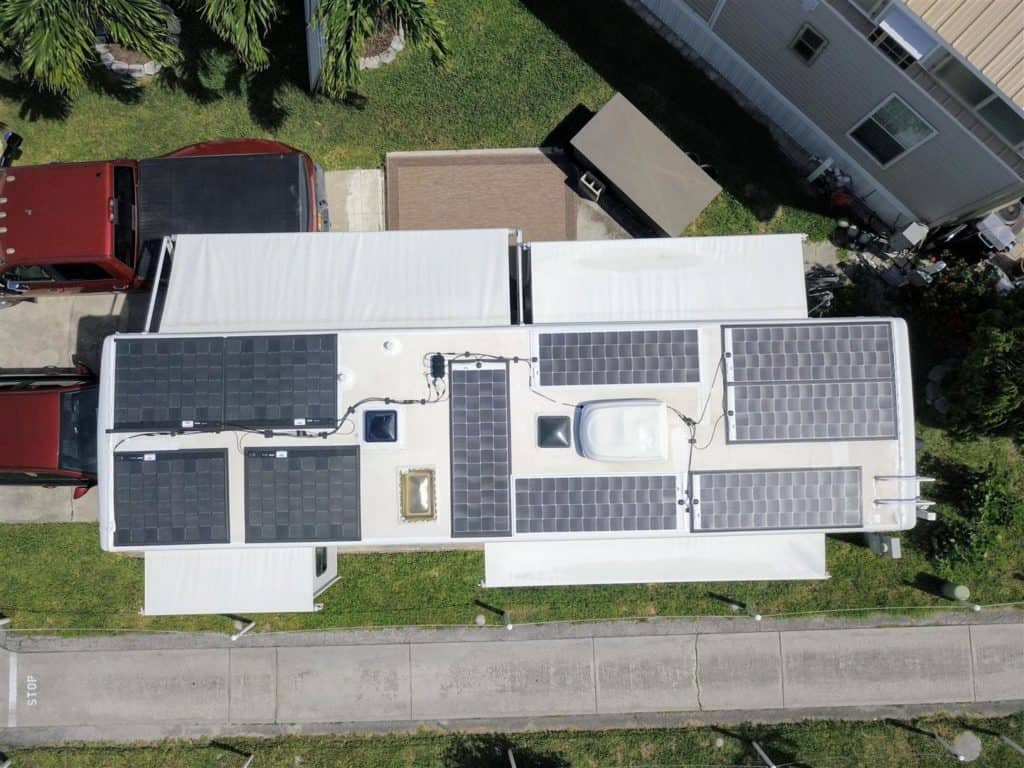
Now that you know a bit more about the off-grid lifestyle, let’s look at a handful of the challenges of this way of living.
Some locations are easier than others to enjoy this lifestyle. Local ordinances can pose a problem and be frustrating to navigate when selecting a location. These ordinances will often vary for residences and mobile living, so familiarize yourself with your local requirements based on your way of living.
Establishing an off-grid residence can be an incredible way to enjoy the lifestyle. An ideal location for an off-grid residence would provide privacy and enough space to install solar panels, wind turbines, a septic system, and a well or rain catchment system.
In general, the more rural you go when selecting a location for your residence, the less red tape you’ll have to encounter. Be sure to verify restrictions and requirements for building an off-grid home before getting too far into the process. You don’t want to spend money only to discover that your dream house isn’t possible in that location.
Additionally, large trees can provide shade in the summer and firewood for the winter months. Strategically placing your residence during construction can also assist with controlling the climate in your home.
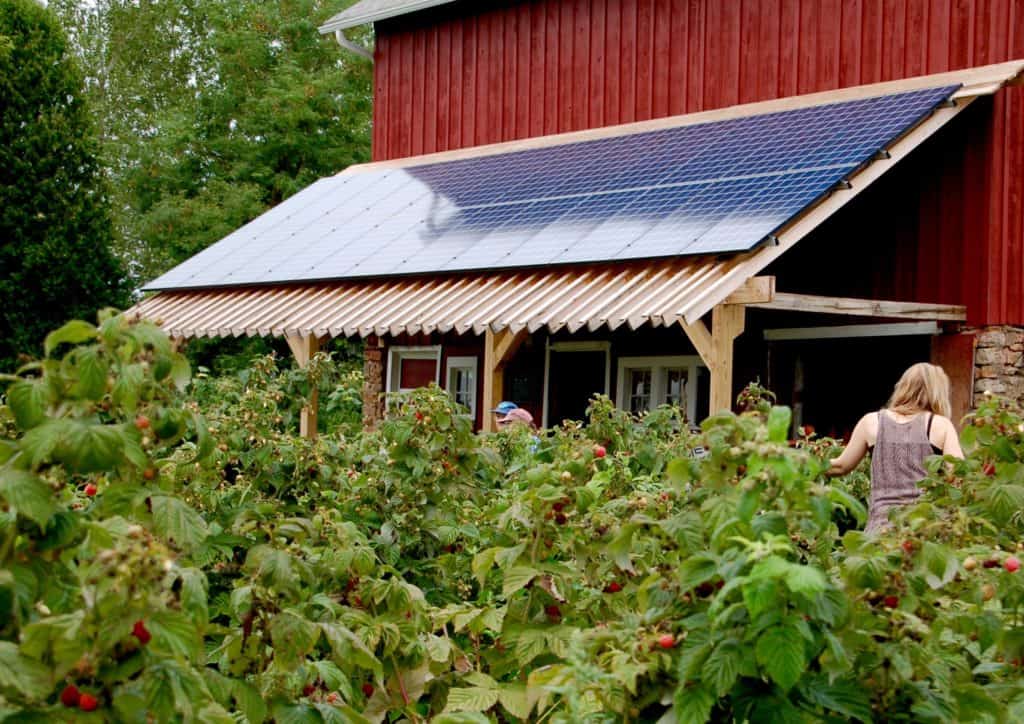
One perk of using an RV or boat for off-grid living is that you don’t have to own the land. However, selecting a location for mobile off-grid living is crucial because you can’t just park your RV or boat anywhere.
The Bureau of Land Management (BLM) has more than 240 million acres and over 400 campgrounds available for RVers to use across the country. Be aware that there are often limits for how long you can stay and permitting requirements. While many of these permits are free, some do come with a cost. Many of these sites can also be shut down at a moment’s notice due to weather conditions or other emergencies. However, the low cost and freedom of living off-grid in an RV are often worth the potential downsides.
You’ll need electricity to run your appliances and live comfortably. When you connect to the power grid, you can use however much electricity you want. If you need more power, the power company will happily sell you more. When you generate your own power, you need to have a solid understanding of how much energy you consume and when.
Many people choosing this lifestyle often make use of solar panels or wind turbines to generate their power. While some do use generators, they’re dependent on a fuel source. Being dependent on a fuel source makes you less self-reliant.
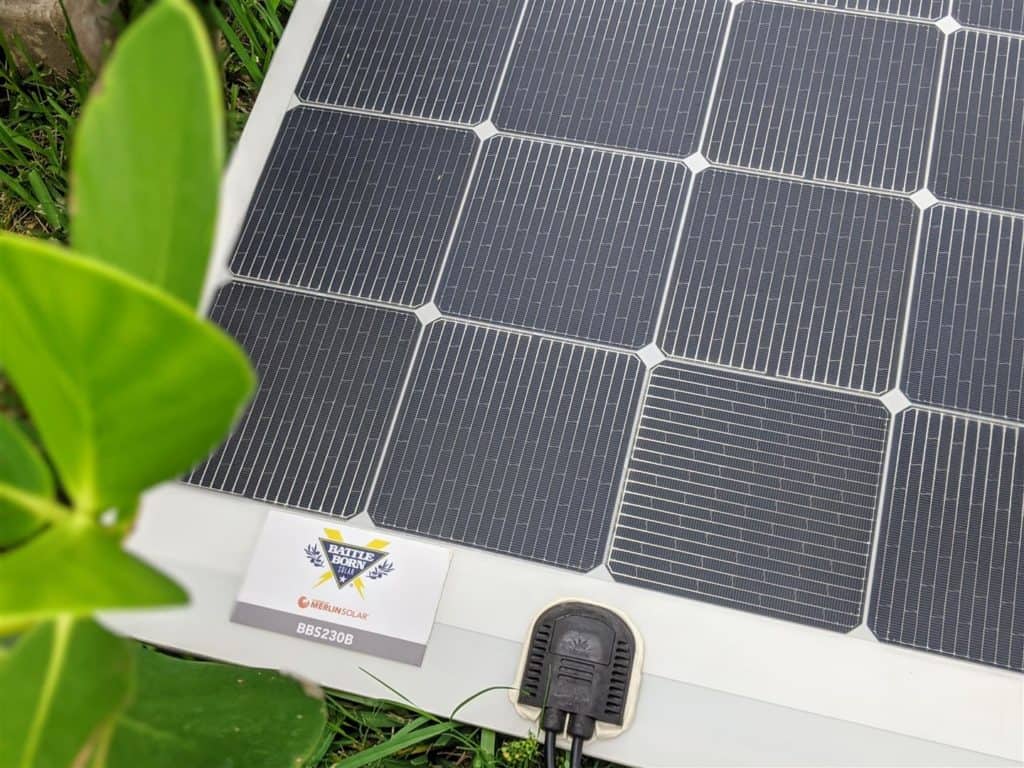
A solar or wind system capable of producing power for your home can be expensive, but the cost savings each month help offset the initial cost. If you’re using wind or solar to create your power, you’ll also need a way of storing it.
Wind turbines and solar panels generate power, but not all the time. You’ll need to store the power you generate for use when the sun goes down or the wind stops blowing. One of the best options for storing energy is by using lithium batteries. While lead-acid or AGM batteries are cheaper, the benefits of lithium batteries far outweigh their competition.
Whatever battery you choose, it will have an amp hour rating (Ah). The more amp hours you have, the longer you can power your electronics. Lithium batteries allow you to use more of the battery without damaging them and have a longer life cycle for each battery. Much like solar panels, lithium batteries are more expensive on the front end, but the extended life helps offset the initial costs.
➡ Find out more by reading 12V Battery Types: Which One Is For You?
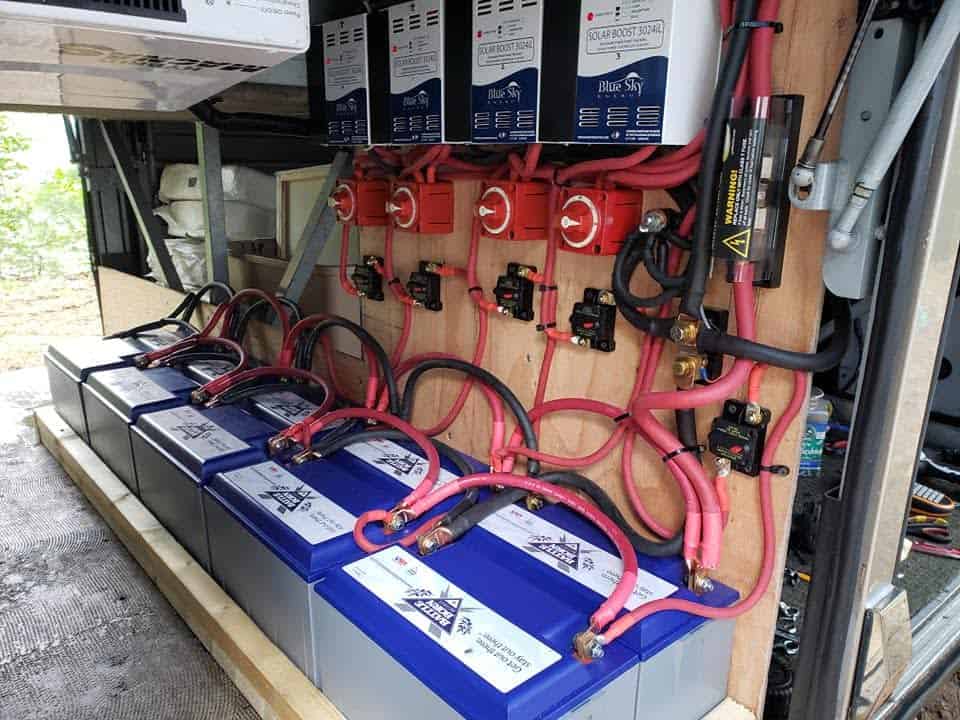
Having a limited amount of power means managing your power usage. Knowing your power needs will help you when sizing your electrical components and wiring. Overloading wiring and components can be dangerous and cause extensive damage to your electrical system. If you’re not comfortable working with electricity, be sure to consult a professional to help design and install a safe and reliable system that meets your needs. Our team also works with a great installer network and can give you recommendations for one in your area. Just give them a call at 855-292-2831.
Staying comfortable while off-grid means addressing your heating and cooling needs while being as efficient as possible. It can be tricky, but with a little bit of thought, you’ll stay comfortable.
Before choosing your heating and cooling sources, the first step is to consider improving the efficiency of your home. Your heating and cooling sources have to do less work if you can keep the hot air out in the summer and the cold air out in the winter. Smaller homes with better insulation, new windows, and new doors will be the most efficient.
There are many ways to heat a home, but only a few stand out as good options for living off the grid. Heaters that require a lot of power aren’t a great idea since you’re generating your own electricity. The best off-grid heating systems are woodburning stoves, pellet or biomass stoves, propane heaters, and active or passive solar heating systems. Additionally, for those who are looking for a renewable option, geothermal heating may be best.
Staying cool while living off the grid means making use of fans and open windows. Air conditioners, much like electric space heaters, require a massive amount of power. If you’re mobile, plan to travel to locations with more temperate weather. If you will need to use power for air conditioning, be sure to factor that into your system ahead of time.
Having access to clean drinking water is essential. Depending on where you live, providing your own source of clean water may be difficult. However, there are a few options available.
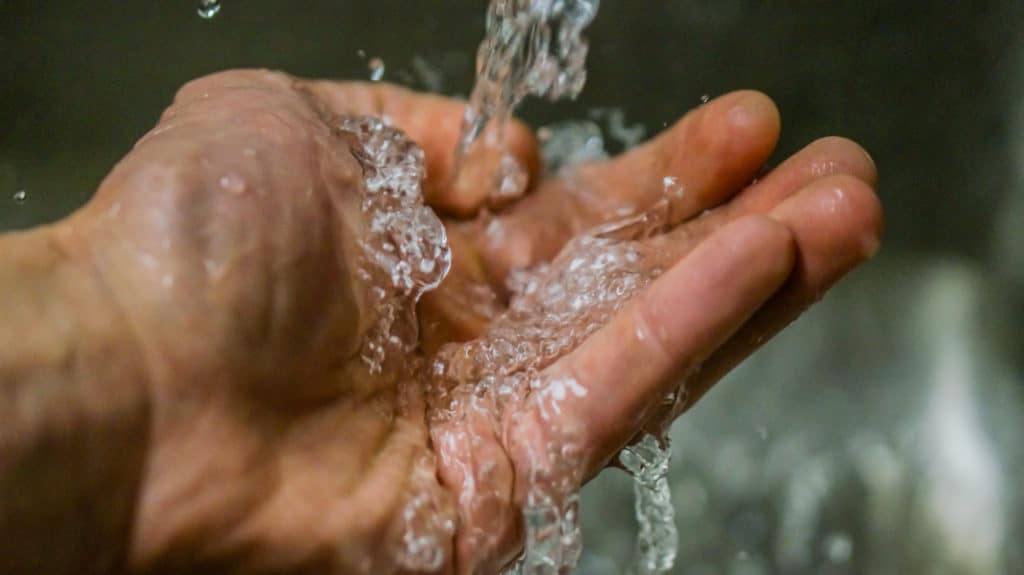
If you live in a rural area, you can likely have a well dug at your location. Wells pull water from underground aquifers, and an electric water pump will pump it into your water lines.
If you live in the city or you’d like to supplement your well, one option is collecting and treating rainwater. Not all locations will get enough rain to make this a viable choice, and in some locations, this practice may even be illegal. If living off the grid for you means providing your own water source, this may prove difficult in the city.
If you’re mobile, there are many truck stops, rest stops, and campgrounds with water available. It may mean filling up a portable tank or the tanks on your mobile unit, but they’re often convenient and inexpensive.
Managing a limited water supply while RVing means finding ways to conserve water is essential. Preparing meals that require few dishes, taking short showers, and reusing greywater are great ways to conserve water. The more water you waste, the more you’ll need to deal with filling your tanks.
Living off the grid means connecting to a city sewer system is not an option. Without a plan, disposing of your waste can be challenging. There are a couple of options that many in this lifestyle consider. The two most popular options are a septic system or a composting system.
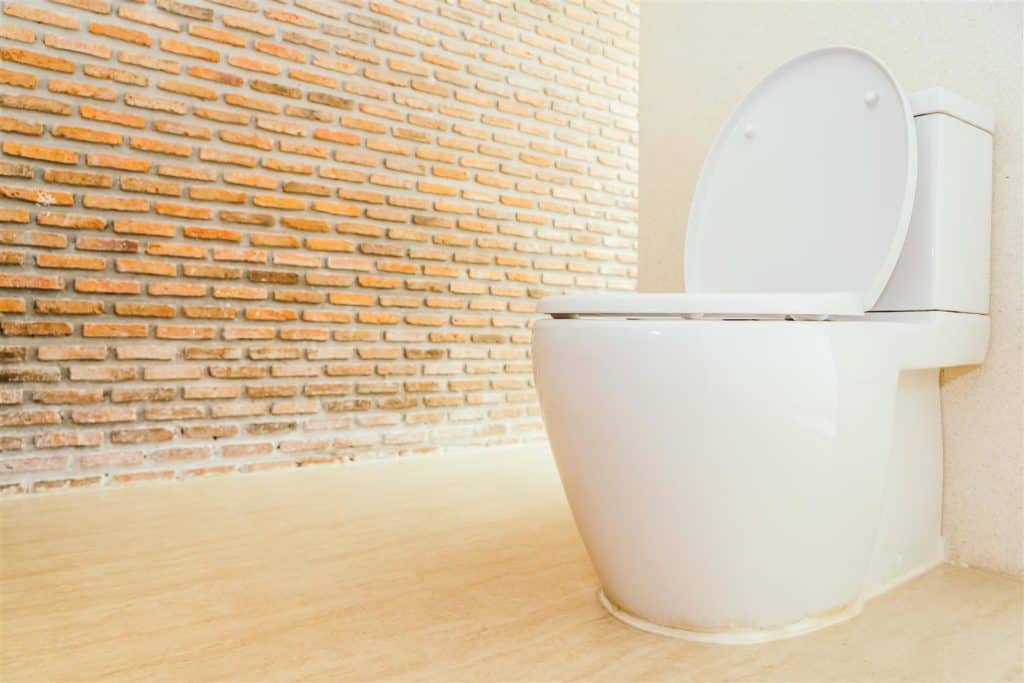
A septic system stores the waste in a tank buried in the ground and breaks it down. The waste then processes through the septic system and into the ground. The earth acts as a filtration system to filter the wastewater safely back into the water table below.
Composting systems break down human waste into compost or fertilizer. Using a composting system requires more effort from the user. Managing humidity levels and liquid-to-solid ratios is essential to help break down the waste properly. The benefit of a composting system is that it can work as fertilizer for plants and vegetation after the waste breaks down. However, many people are uncomfortable with the process of a composting system and opt for a septic system instead.
A composting system is a viable solution for both stationary and mobile off-grid living. Many RVers use them on the road with great success. However, some RVers are either disgusted by the idea or don’t want to deal with the upkeep.
There’s often access to dump stations at campgrounds, truck stops, and even some rest stops for those that are mobile. An RV dump station is an easy way for RVers to dump their tanks on the road. However, it might not be convenient to tow your vehicle to the dump station frequently.
To avoid having to take your RV to the dump station, you can hire a sanitation service to come empty your tanks. They’ll haul the waste away in a massive tank on the back of their truck and dispose of it for you.
Living off the grid can be environmentally conscious and very rewarding. The freedom the lifestyle allows individuals to experience is a large reason many are choosing the lifestyle. Taking a long weekend off the grid is a great way to get a small taste of what these people experience every day of their lives.
Would you ever consider living off the grid?

We know that building or upgrading an electrical system can be overwhelming, so we’re here to help. Our Reno, Nevada-based sales and customer service team is standing by at (855) 292-2831 to take your questions!
Also, join us on Facebook, Instagram, and YouTube to learn more about how lithium battery systems can power your lifestyle, see how others have built their systems, and gain the confidence to get out there and stay out there.
Shop Best Sellers

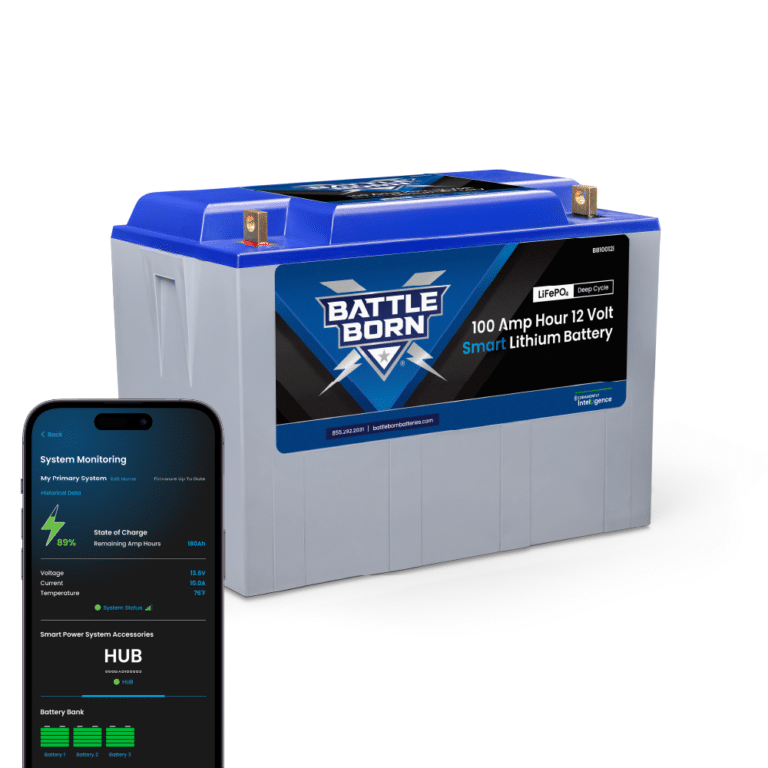

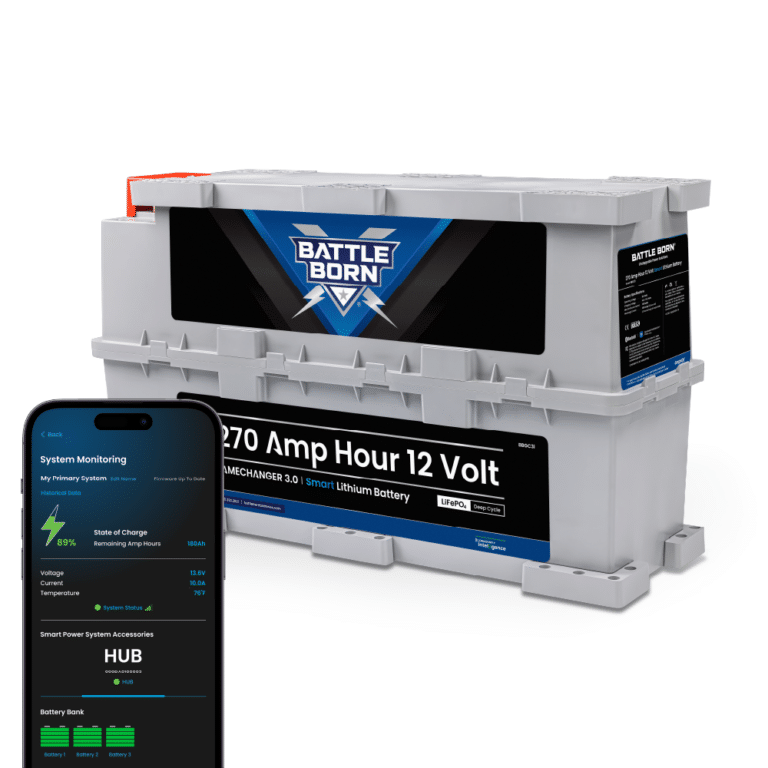




Ask a technical specialist now at 855.292.2831
Stay in the Know